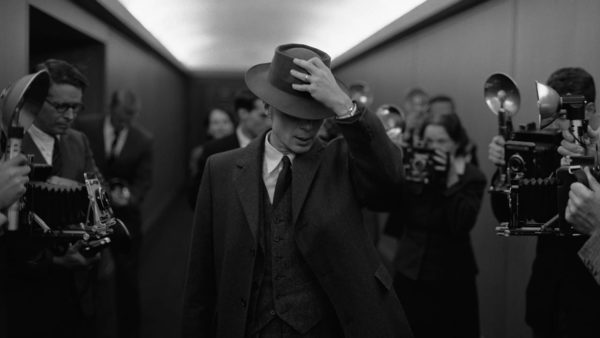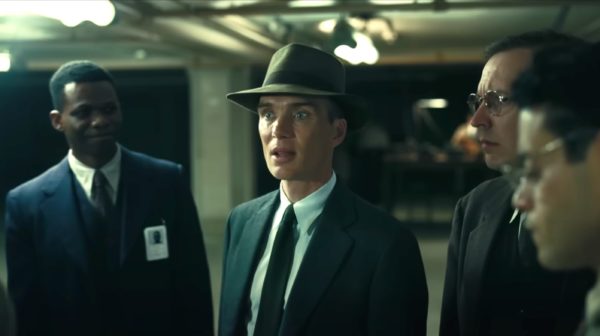
There comes a point in Oppenheimer where audiences may just wonder: is there a single white male actor working in Hollywood that isn’t in this movie?!
It’s a testament to writer/director Christopher Nolan’s reputation that he’s able to pull in such a deep bench catalogue of actors for his latest cinematic opus. Oppenheimer is an incredibly ambitious three hour ode to J. Robert Oppenheimer (Cillian Murphy), the man who led the Manhattan project in the creation of the Atomic bomb.
Nolan frames the narrative using two different hearings: a Communist witch hunt masquerading as a security clearance hearing presided over by Gordon Gray (Tony Goldwyn) and Roger Robb (Jason Clarke) and a US Cabinet confirmation hearing for Lewis Strauss (Robert Downey Jr), former head of the Atomic Energy Commission. The former is presented in colour, while the latter is in black and white (presumably to aid audiences in distinguishing the timelines).
In between is the somewhat-linear chronological tale of how Oppenheimer began his career as a physicist, dabbled in joining the Communist party thanks to associations with his brother Frank (Dylan Arnold) and lover Jean Tatlock (Florence Pugh), before eventually getting assigned to Los Alamos where he oversaw the development of the A-bomb.
Oppenheimer is wildly ambitious in its scope and unapologetic about its pacing. Characters flit in and out of the story and the editing, particularly in the first act, is speedy. This gives the story a sense of urgency, although some audiences may struggle to keep track of the myriad number of characters and comprehend the hysteria about anti-communist sentiment that drives much of the narrative.

It’s clear early on that Oppenheimer is a genius – he picks up languages quickly, he’s fond of debate, and he ingratiates himself in a crowd with relative ease. One of the main thrusts of the narrative is exploring not just how he steered the creation of A-bomb, but also how he (does and does not) negotiate the personalities and the politics involved in the project.
The other overarching theme is the responsibility Oppie bears for changing the course of history. The narrative assumes that the historical outcome of his work (ie: the destruction of Hiroshima and Nagasaki) is widely known, so Oppenheimer uses that as shorthand to examine how the Atomic bomb contributed significantly to the escalation of the arms race. Initially the project’s goal is to beat the Nazis to the punch and end WWII, but when Hitler is defeated that shifts to securing Japan’s surrender. It is only after bombing the two Japanese cities that Oppenheimer truly realizes what they’ve begun is a never-ending race to build a bigger, more destructive weapon.
This is where the last act of the film focuses its time and energy, with the micro-level petty personal conflict between Oppenheimer and Strauss mirroring the macro-level implications of mutually-assured destruction on a global scale (hence the plot device of the two hearings).
It works to a certain degree because Nolan is so incredibly proficient at dramatizing the back room politics and generating audience sympathy for Oppenheimer, whose fall from grace occurs almost as soon as the US government no longer needs his help to win the war.
Alas, while the story is obviously designed to build to the outcome of both Strauss’ confirmation and Oppenheimer’s security clearance hearing, Oppenheimer‘s true climax is its much-publicized recreation of the Atomic bomb test at Los Alamos. It’s such an exciting sequence that the film doesn’t fully recover its sense of pacing and wonderment; small, closed-room meetings where men yell and confront each other simply can’t compete with the visual wonder of the epic explosion.
Nolan overcompensates by cranking up the volume on Ludwig Göransson’s bombastic violin-heavy score, but it winds up feeling somewhat desperate and emotionally manipulative. This – combined with the almost cartoonish exchanges between Strauss and his Senate aide (Alden Ehrenreich) – make the climax feel especially heavy-handed.

There is also something ironic about how Nolan idolizes his subject considering how much of the story is about the hubris of man (the film literally opens with a quote about Prometheus stealing fire from the gods). Criticisms about the writer/director’s tendency to focus on male-driven stories and his inability to write three-dimensional female characters also won’t be challenged by the film; Pugh spends the majority of her brief screen time topless or throwing out flowers, while Emily Blunt (as Oppie’s wife Kitty) mostly just drinks until she gets a few explosive scenes near the film’s end.
Many of the main performances are very strong, especially Murphy, RDJ, and Matt Damon (as Oppenheimer’s military handler and friend, General Groves). The rest of the cast barely gets enough to do to stand out, though the litany of actors Nolan recruited is impressive (between this and Barbie, it’s the summer of massive casts).
The Bottom Line: Oppenheimer is a technical marvel with strong performances and several truly astounding sequences. While Nolan’s ambition sometimes overshadows his execution and the film never truly recovers following the excitement of its atomic explosion, Oppenheimer offers appealing summer counter programming and will undoubtedly be a major Oscar contender, particularly in the technical categories. 3.5/5
Oppenheimer is now in theaters